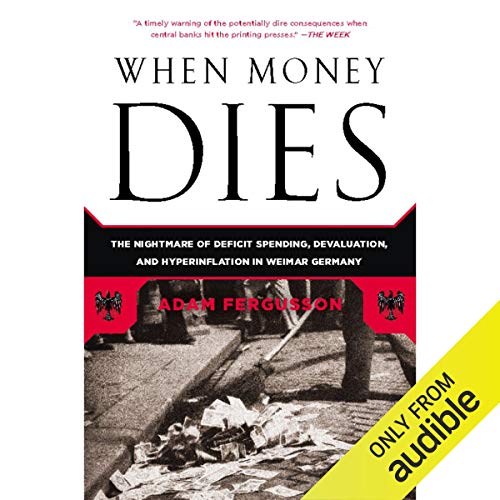When Money Dies: The Nightmare of Deficit Spending, Devaluation, and Hyperinflation in Weimar Germany audiobook
Hi, are you looking for When Money Dies: The Nightmare of Deficit Spending, Devaluation, and Hyperinflation in Weimar Germany audiobook? If yes, you are in the right place! ✅ scroll down to Audio player section bellow, you will find the audio of this book. Right below are top 5 reviews and comments from audiences for this book. Hope you love it!!!.

Review #1
When Money Dies: The Nightmare of Deficit Spending, Devaluation, and Hyperinflation in Weimar Germany audiobook free
A remarkable Book, at times difficult, as these were confusing times for most people, and that perplexity is captured in this intersection of chaos economics and human behavior. The quotes from Erna von Pustaus diary & Lord DAbernon, British Ambassador to Berlin, are revelatory, as is Ernest Hemingways reporting for the Toronto Star of the shopping sprees and dining possible for him and his wife with an American 5 dollar bill when crossing the border from France into Germany. The book is readable precisely because the many details of everyday life woven into the narrative of rising inflation offset the sometimes incomprehensible currency numbers from QE on steroids.
Similarities between Reichsbank policies letting loose inflation and todays USA Federal Reserve today are striking, as are the differences. In analog Germany in 1923 it took 30 paper mills, 150 printing firms, 2,000 printing presses and tens of thousands of employees, trucks and railroad cars working 24×7 (except Sundays) to distribute all the paper currency to banks and workplaces in time for payday. Still, they came up short and factories and cities had to develop their own currencies and script to survive. Whereas today, the Federal Reserve can just tap a few keys and add as many zeroes as it likes to the 1s on the computer screen and billions and trillions get distributed in minutes and hours, rather than days or weeks. Indeed, took me just 9 minutes last night on IRS web site to determine my eligibility and get my stimulus check routed to my bank account. Such speed of money distribution would not have been possible in analog Germany of 1923, though people spent shopping bags full of money as fast as they could on whatever they could. Thieves stole the suitcases and shopping baskets used to tote the currency, and dumped the paper money. Those with gold and foreign currency prospered, as did those with fixed mortgages and debts paying them off in worthless German currency.
My favorite QE money-printing quote in book, from Lord DAbernon, British Ambassador to Berlin (p135): Inflation is like a drug in more ways than one. It is fatal in the end, but it gets its votaries over many difficult moments. The big question that the book answered for me was: Why did the government do it? QE money-printing to infinity seemed to work: Germany after WWI had full employment, which made the country seem prosperous despite the inflation, whereas Britain suffered a depression and massive unemployment. But all was not as it seemed on the surface. But to the victorious Allies who were suffering bad economies and high unemployment, Germany appeared wealthy and ripe to press for Versailles Treaty reparations. German stock market was skyrocketing in nominal terms, but down drastically when compared to pre-WWI or translated into foreign currencies. When the Versailles Treaty victors collecting reparation debts from Germany finally forced a stable currency and inflation died down, unemployment skyrocketed and the German economy really collapsed. QE to infinity in Germany kept people working, put off the day of reckoning for several years, which is an eternity in political time. Reichsbank in 1923 and Jerome Powell and the Fed today, same spiel about doing whatever it takes, printing as much money as needed. Even Russia agitation, and France teaming up with German communists in 1923. Worth reading the book for a fuller understanding.
Review #2
When Money Dies: The Nightmare of Deficit Spending, Devaluation, and Hyperinflation in Weimar Germany audiobook streamming online
Though written in the 1970’s, about an historical era almost exactly a century ago, on another continent, it makes fascinating, and somewhat disturbing, reading.
There is a nice mixture of history, both political and economic, along with personal anecdotes and observations by people who were living through the events. Visiting British diplomats and businessmen could observe the inflation unfold and speculate on its causes and course, while the travails of ordinary bourgeois Germans, recorded in diaries at the time, or recalled later, show particular experiences that make the calamity personal and real.
The book’s weaknesses, for a modern American reader, are several, though none severe. There is a constant use of older British monetary units (pounds, shillings, etc.) and the “long scale” of naming large numbers (so instead of billion we read millard, and rather than trillion, we read billion, etc.). This can slow down a reader if he insists on understanding exactly how large the amounts of currency, or small the purchasing power, at any moment.
In addition, there is a slight disconnection from the central players, bankers and politicians, who were at least nominally responsible for the inflation. We’d like, on occasion, to learn more of their backgrounds and thinking, to account for the stupidity of the whole thing. A few historical characters end up as “cardboard cut-outs” – where there must have been more to their decision-making than is apparent. Though maybe not. The whole thing appears to have been incredibly stupid (though many of the participants were highly intelligent, and usually degreed). The rank stupidity of it was apparent to contemporaneous observers, though none had the power to influence events. Hitler lurks in the background as well, cropping up repeatedly to take advantage of events. There are plenty of histories of his and the Nazis’ early rise for those who want to see more of that part of the story – and he was not an instigator of the inflation but one of many radical opportunists attempting to take advantage.
The larger geopolitical situation is adequately covered, including the situation in neighboring Central Power defeated nations, and in Britain and particularly France, the victors of a Great War that had no true winners. For its length, the historical background seems good to excellent, with the exception of a few German leaders being left rather opaque. One relatively short book cannot cover every aspect of an event so intimately tied to all the other events of such a chaotic and consequential era.
But mainly, this is a riveting story – as an accelerating economic, political and human disaster unfolds, relentlessly, and apparently beyond the power and insight of any responsible party to halt. Its resolution is not so well covered, though we learn a lot. How could it be, really, with the social disasters awaiting Germany and the world as economics and politics played out over the following decades.
And the disturbing part? In the era of Corona virus, we see nations, not least the United States, attempting to recover from an economic disaster (an economy wrecked not by war but by policy over-reaction to an epidemic) through monetary means. The supposed sophistication of our modern bankers, revealed as illusionary by repeated recent miscalculations (the “housing bubble” mortgage melt-down the most prominent recent one), is no guarantee of safety. Indeed, misplaced confidence in the wise men only encourages carelessness. The US dollar is the world’s reserve currency – we can get away with essentially unlimited unfunded spending of “printed” money (the computer and digital account entries are the modern version of the printing press) – or so we are told.
But, what have we really learned from the computerized era of finance? That what took hours, days, weeks, or months in the days of paper transactions can occur in seconds today. We have seen it repeatedly in market panics, triggered by some often minor event, magnified by automated trading programs. The same desire by politicians to provide benefits without exacting taxes to pay for them, and of bankers to accommodate the politicians, which was behind the Wiemar hyper-inflation, is alive and well today – with frankly a lower quality of political talent.
Human nature has not changed, though the means available to us has – our current tools are more efficient, and hence more dangerous. When reading “When Money Dies”, it is impossible not to think of the trillions in Corona virus fiscal support, while the virus, and the insanity of race riots and nihilistic anarchy paralyze our cities, and an election looms where politicians hope to dupe the American people into giving them the power to magnify the current cultural, political and economic chaos many times. How far away are we, after all, from making the mistakes of post Great War Germany? How much can our current financial position in the world economy shield us from the consequences, and how much faster will those consequences unfold, given our pivotal world economic position and the speed of modern financial transactions, should the dam break?
Money could die in a day, not over the course of years.
It will make a hell of a story if anyone survives to tell it.
Meanwhile, read “When Money Dies”, and enjoy the misery of others experiencing the cruelty of history, enhanced by the existential unease of suspecting that something similar in origin, if not in outcome, could occur again. And this time, history could happen to us.
Review #3
Audiobook When Money Dies: The Nightmare of Deficit Spending, Devaluation, and Hyperinflation in Weimar Germany by Adam Fergusson
I am from Venezuela, a country that is suffering all manners of disruption including hyperinflation. Mr. Fergussons Highly readable book explains how it was in post World War I Germany, including the policy that produced Germanys hyperinflation and how that hyperinflation went on to destroy most Germn govt and economic institutions
S, clearing the way for Hitlers ascendancy.
Despite the many differences between Germany in the 1920s and Venezuela today, the book helps to understand the hows and whys of todays disasters in Venezuela
Review #4
Audio When Money Dies: The Nightmare of Deficit Spending, Devaluation, and Hyperinflation in Weimar Germany narrated by Antony Ferguson
The book was well-researched, with plenty of information about how much items cost and what wages were. It put the politics of the inflation at its center, describing each government and its leaders and how and why they failed to deal with the problem. The author’s central premise is that the failure to understand and deal with the inflation pushed people into more extreme politics.
The writing is difficult to read and with lots of unsupported statements about the politics. The writing style is halfway between a collection of first-hand accounts and a dissertation. The writer muddles his thoughts with chapters headings based on time, but then each chapter wanders both forward and backwards through various events, making the the point of each chapter confusing. Many points in this book would have been much clearer with some tables or charts to illustrate the changes, but none were included.
I would not recommend this be your first book on the subject. I’m hoping there are some better accounts out there.
Review #5
Free audio When Money Dies: The Nightmare of Deficit Spending, Devaluation, and Hyperinflation in Weimar Germany – in the audio player below
In 1914, 20 German Marks equalled a British pound. By 1924 a British pound was equal to the number of yards to the sun and Germany was all but a barter economy. The First World War had left Germany on its financial knees, though its industrial base remained strong. The payments to the allies under the Versailles Treaty hung heavily on the struggling economy. Gradually inflation started to rise, devaluing the mark against foreign currencies. This allowed German business to grow, but the domestic economy started to spiral out of control. The Reichsbank’s solution was to increase wages and print more money to enable the populace to purchase goods. And as prices increased, the denominations of notes increased, and the value of savings and pensions plummeted. It soon became apparent that the only way to extract the value of money was to immediately spend it as Germany entered a period of hyper-inflation (when the value of money at the end of a month was worth half that at the start). By 1923, it was not uncommon for salaries to be raised several times a month to keep pace with inflation. Unable to pay the reparations to the Allies, the French and Belgians moved into the Ruhr, Germany’s industrial heartland, to seize and exploit its assets, further weakening the economy and its ability to make such payments. Whilst people suffered, unemployment remained quite low, however by 1924 it was clear that a new strategy was needed to end the madness of exponential inflation. The solution was to introduce a new currency with a stable commodity base and to move the economy onto it, and to balance the books to reduce the need for deficit finance. The result, whilst curbing inflation, was a massive drop in industrial production as German goods became more expensive on the world market leading to mass unemployment. Although not directly responsible for the rise of National Socialism, Fergusson makes a good case that the turbulence of economic circumstance, the disenfranchisement of the middle classes, and the rise of unemployment helped provide the conditions within which it could grow.
Adam Fergusson does an admirable job of detailing for a lay audience what happened with the German economy in the early 1920s. He uses a mix of historical sources, including letters, British diplomatic material, and newspaper reports. Sometimes the narrative is a little dry and it would have been good to include more detail on Austria and Hungary, the strategy of German industrialists, and the French/Belgian intervention in the Ruhr. Although not its intention, what the book demonstrates is the value of the European project in binding Europe into a common monetary framework that makes it easier for countries whose economy is in trouble to weather financial storms. As the present crisis demonstrates, that process is not always straightforward and easy, and is fraught with difficult politics and decisions, but what Fergusson’s book highlights is that trying to cope on their own with politicians who seem clueless about core economic principles can be a hell of a lot worse.
Recommend Books
Galaxyaudiobook Member Benefit
- Free 2000+ ebooks (download and online)
- You can see your watched audiobooks
- You can have your favorite audiobooks
- After 15-Sep-2021, Bookmark will only available for Galaxyaudiobook member
Galaxy audio player
If the audio player does not work, please report to us, we will fix it as soon as possible (scroll up a little you will find the "REPORT CONTENT" button).












0 Comments: